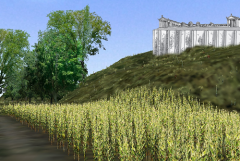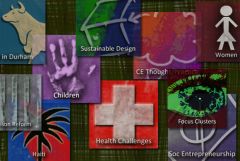Emerging Networks
Emerging Networks are a culture change mechanism intended to shift humanities research towards broadly collaborative, interdisciplinary engagements in contrast to the largely solitary efforts that tend to characterize traditional humanities research. Our goal is for nimble and opportunistic cross-disciplinary collaboration to become part of our ethos in realizing humanistic scholarly curiosity. Emerging Networks funding supports short term collaborative projects that must involve faculty, graduate students and undergraduates from multiple disciplines—across humanities departments and/or the social and natural sciences at Duke.
Projects
|
2013-2014
Maurizio Forte, William and Sue Gross Professor of Classical Studies and Visual Studies, is a pioneer in the field of digital and virtual archaeology with research projects in Italy, China, Ethiopia, Mexico, Egypt, Peru, the United States, and...Read More about Envisioning Landscape Archaeology
|
|
2014-2015
This project will connect Duke students who are heritage speakers with students in other colleges in the USA and in Mexico who have similar backgrounds (a heritage speaker speaks English and also speaks or at least understands a language other than...Read More about Framing Identities in Motion
|
|
2012-2014
This project investigates the cultural exchange between African American and German culture during the 20th century, from the Harlem Renaissance through the Civil Rights movement and beyond. Interdisciplinary as well as intercultural, the topic is...Read More about From Harlem to Hamburg
|
|
2014-2016
Until the last decade or so, African-American and working-class white women cleaned the houses of the well-off in the American South. There has been a striking changeover in recent years. Thanks to the massive influx of Latin American migrants into...Read More about Housecleaner Project
|
|
2012-2013
Most humanities faculty members unilaterally determine the themes, authors, books, blogs, and other materials to appear in an undergraduate level syllabus. Conversely, within most humanities classrooms, the same faculty members apply a more student-...Read More about Humanities on Demand
|
|
2011-2012
This project will develop "Civic Engagement Knowledge Maps" - a novel, university-wide resource conceptualized and designed by the Duke Center for Civic Engagement (DCCE) to identify, build, and strengthen links between civic engagement and Duke's...Read More about Knowledge Maps
|
|
2012-2013
Empathy, or the ability to understand and participate deeply in another person’s experience, is considered a critical skill for physicians, both for clinical competence and for patient (and physician) satisfaction. Yet over the course of...Read More about Learning to Listen
|
|
2015-2016
The United States has by far the highest incarceration rates in the world, with approximately 1 in every 108 American adults (2.3 million) currently in jail or prison. It is deeply divided by race: 1 in 15 African American men are currently...Read More about Mass Incarceration
|
|
2013-2014
Muslim Publics: Religion and Revolution examines the aesthetics of political change in the Middle East through three distinct but interrelated projects on social media and social movements (Negar Mottahedeh), Islamic understandings of human rights...Read More about Muslim Publics
|
|
2012-2013
The History Department has recently re-structured its major to provide undergraduate students with a framework for connecting their studies with their broader social, ethical, and professional objectives. The Department now seeks to link its...Read More about Networks of Knowledge
|










